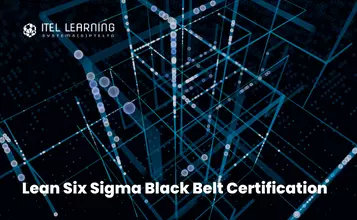Overview
Lean Six Sigma Black Belt (LSSBB) is catered to a professional, who is well versed in the Lean Six Sigma methodology, who leads improvement projects, typically in a full-time role. A Lean Six Sigma Black Belt possesses a thorough understanding about how to perform and interpret Six Sigma tools and how to use standard principles of Lean.
IASSC (International Association of Six Sigma Certification) is a Professional Association dedicated to growing and enhancing the standards within the Lean Six Sigma community.
This 5-day classroom-led course is based on IASSC LSBB body of knowledge that is the basis of the IASSC Certified Black Belt Exam. The exam’s questions may test up to the complexity level of “Analyze” as defined by Levels of Cognition based on Bloom’s Taxonomy – Revised (2001).
Prerequisites
No prerequisites required upon taking this course.
Who Should Attend?
This course is recommended to Managers and Executives of all types of industries including Banking, Hospitality, Logistic & supply chain, Engineering, Customer services, Manufacturing, Finance, Hospital or to individuals who are looking for career enhancement.
Course Outline
- The Basic of Six Sigma
- Meaning of Six Sigma
- General History of Six Sigma & Continuous Improvement
- Deliverables of a Lean Six Sigma Project
- The Problem-Solving Strategy Y = f(x)
- Voice of the Customer, Business and Employee
- Six Sigma Roles & Responsibilities
- The Fundamentals of Six Sigma
- Defining a Business Process
- Critical to Quality Characteristics (CTQ’s)
- Cost of Poor Quality (COPQ)
- Pareto Analysis (80:20 rule)
- Basic Six Sigma Metrics
- Selecting Lean Six Sigma Projects
- Building a Business Case & Project Charter
- Developing Project Metrics
- Financial Evaluation & Benefits Capture
- The Lean Enterprise
- Understanding Lean
- The History of Lean
- Lean & Six Sigma
- The Seven Elements of Waste
- 5S
- Process Definition
- Cause & Effect/ Fishbone Diagrams
- Process Mapping, SIPOC, Value Stream Map
- X-Y Diagram
- Failure Modes & Effects Analysis (FMEA)
- Six Sigma Statistics
- Basic Statistics
- Descriptive Statistics
- Normal Distributions & Normality
- Graphical Analysis
- Measurement System Analysis
- Precision & Accuracy Bias
- Linearity & Stability
- Gage Repeatability & Reproducibility
- Variable & Attribute MSA
- Process Capability
- Capability Analysis
- Concept of Stability
- Attribute & Discrete Capability
- Monitoring Techniques
- Patterns of Variation
- Multi-Vari Analysis
- Classes of Distributions
- Inferential Statistics
- Understanding Inference
- Sampling Techniques & Uses
- Central Limit Theorem
- Hypothesis Testing
- General Concepts & Goals of Hypothesis Testing
- Significance; Practical vs. Statistical
- Risk; Alpha & Beta
- Types of Hypothesis Test
- Hypothesis Testing with Normal Data
- 1 & 2 sample t-tests
- 1 sample variance
- One Way ANOVA
- Hypothesis Testing with Non-Normal Data
- Mann-Whitney
- Kruskal-Wallis
- Mood’s Median
- Friedman
- 1 Sample Sign
- 1 Sample Wilcoxon
- One and Two Sample Proportion
- Chi-Squared (Contingency Tables)
- Simple Linear Regression
- Correlation
- Regression Equations
- Residuals Analysis
- Multiple Regression Analysis
- Non-Linear Regression
- Multiple Linear Regression
- Confidence & Prediction Intervals
- Residuals Analysis
- Data Transformation, Box Cox
- Designed Experiments
- Experiment Objectives
- Experimental Methods
- Experiment Design Considerations
- Full Factorial Experiments
- 2k Full Factorial Designs
- Linear & Quadratic Mathematical Models
- Balanced & Orthogonal Designs
- Fit, Diagnose Model and Center Points
- Fractional Factorial Experiments
- Designs
- Confounding Effects
- Experimental Resolution
- Lean Control
- Controls Methods 5S
- Kanban
- Poka-Yoke (Mistake Proofing)
- Statistical Process Control (SPC)
- Data Collection for SPC
- I-MR Chart
- Xbar-R Chart
- U Chart
- P Chart
- NP Chart
- X-S chart
- CumSum Chart
- EWMA Chart
- Control Methods Control
- Chart Anatomy
- Subgroups, Impact of Variation, Frequency of Sampling
- Center Line & Control Limit Calculations
- Six Sigma Control Plans
- Cost Benefit Analysis
- Elements of the Control Plan
- Elements of the Response Plan








